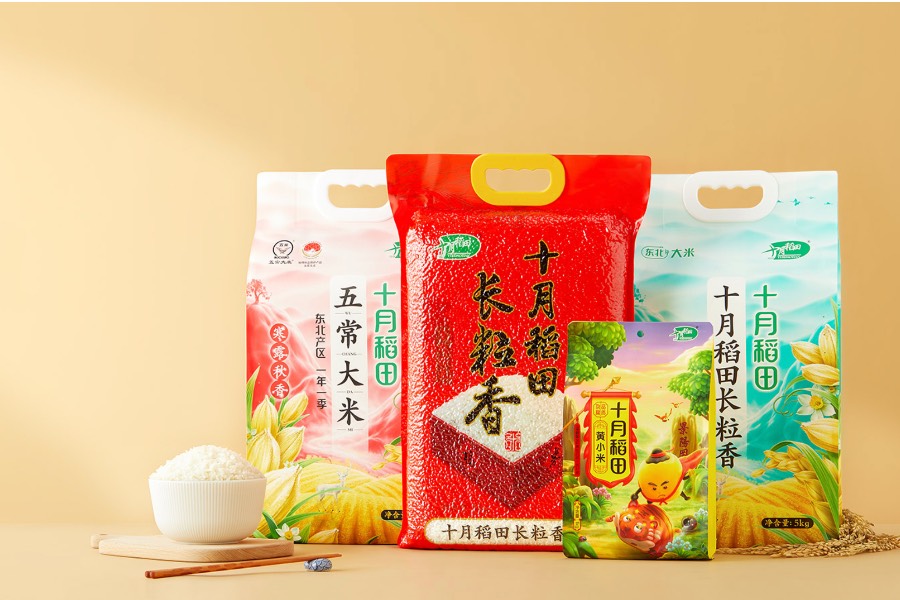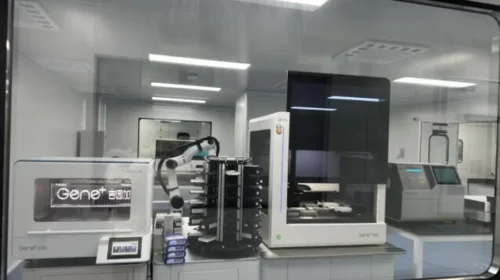Shiyue Daotian serves up tasty dividends as profits surge

The pre-packaged rice supplier said its profit nearly doubled in the first half of the year as it increasingly focuses on premium products
Key Takeaways:
- Shiyue Daotian said its adjusted profit rose 90% or more in the first half of the year, as it places greater emphasis on higher-margin premium products
- The rice seller’s stock is more highly valued than other food companies, even after JD.com founder and Chairman Richard Liu sold down his stake earlier this year
By Bai Xinrui
Investors have historically shied away from food stocks, put off by their low growth and thin profits. But pre-packaged rice seller Shiyue Daotian Group Co. Ltd. (9676.HK) might be an exception, showing there are still big sales and profits to be found in China’s massive rice market. Its strong financial health was front-and-center earlier this month when the company said it expected to report its adjusted net profit jumped 90% or more in the first half of this year. Buoyed by the news, Shiyue Daotian’s shares surged as much as 17.6% the following day, before closing up 8.5%.
The company attributed the big increase to a better product mix, as well as greater cooperation with premium sales channels and its growing brand influence, which in turn boosted sales over its various channels.
Founded by Chairman Wang Bing and his spouse, executive director Zhao Wenjun, Shiyue Daotian entered the kitchen staple food industry in 2005. It established its core Shiyue Daotian, which means “October rice paddies,” and Firewood Courtyard brands in 2011, selling nearly half of its products online.
The company is one of several emerging as potential leaders in the highly fragmented market for China’s leading staple. It is finding recent success by moving up the value chain to offer more premium products that cater to China’s growing middle class.
Staple breadwinner in rice
Shiyue Daotian’s revenue reached 5.75 billion yuan ($800 million) last year, up 18% year-on-year. Rice products contributed 4 billion yuan, or about 70% of the total, followed by coarse grains, beans, and other products, which brought in 470 million yuan, accounting for a much smaller 8.2%. E-commerce platforms were one of the company’s main sales channels, contributing 41.6% of the total.
Rice is the biggest product in China’s massive staple food market, generating 723.4 billion yuan in 2022 alone, accounting for 38.8% of overall sales. But the sector is quite typical of the low growth for food products, projected to reach just 791.8 billion yuan by 2027, translating to annual growth of just 1.8% between 2022 to 2027.
Shiyue Daotian focuses on pre-packaged rice, which is typically packed prior to sale in quantities not exceeding 25 kilograms. Such products enjoy greater popularity than other rice goods, allowing the category to grow more quickly due to greater ease of transport and better preservation of qualities like freshness and taste. China’s pre-packaged rice market is expected to grow by 4.9% annually to reach 164.1 billion yuan by 2027, expanding far faster than the broader rice market over the same period.
Premium prices for premium rices
The broader pre-packaged rice market is broadly divided into the premium and ordinary rice segments. Premium products typically contain less than 15% broken grains. Such lower rates often signify higher grain integrity and quality, allowing sellers to charge more for those premium products.
According to Shiyue Daotian’s prospectus for its 2023 IPO, the average retail price for pre-packaged premium rice exceeded 7.4 yuan per kilogram in 2022. By comparison, regular rice products averaged 6.6 yuan per kilogram, meaning premium rice commanded a premium of more than 10%.
Shiyue Daotian is already a leader in pre-packaged premium rice, controlling 4% of the segment in China in 2022. By comparison, the combined market share for the top five players was just 11.1%, suggesting significant room for consolidation. That means Shiyue Daotian could be well-positioned to capitalize on growing demand for premium rice from a growing middle class that’s increasingly willing to spend more on higher-quality foods.
High dividend payout
In its brief history as a publicly traded company, Shiyue Daotian has also become known for its generosity to shareholders. The company pledged at the time of its IPO that it would distribute at least 20% of its profit as dividends. But it far exceeded that standard in 2024, announcing total dividends of 175 million yuan, equal to 50.1% of its adjusted profit.
Despite such generosity, the company’s stock has turned in a lukewarm performance since its IPO. After selling shares for HK$15.36 apiece, the stock briefly jumped above HK$20 in its first few weeks of trading. But then it went into a slow decline. Even after factoring in the recent jump following the positive profit alert, the stock’s latest close of HK$8.69 is still more than 40% below its IPO price.
Notably, one of the company’s high-profile shareholders, Richard Liu, founder and chairman of e-commerce giant JD.com, was selling down his stake earlier this year. According to Hong Kong Stock Exchange filings, Liu reduced his holdings by 13.26 million shares, 12.28 million shares, and 1.1 million shares on April 9, 10 and 14, respectively, netting him HK$217 million ($28 million). In that process, his stake in the company fell from 19.27% to 12.79%. Any further divestments could pressure the stock price if people interpret such sales as showing a lack of confidence in the company’s prospects.
What’s more, Shiyue Daotian’s valuation looks relatively high, even after its post-IPO declines. Even if we assume its profit will double this year, based on its first-half profit forecast, the company would still have a relatively high forward price-to-earning (P/E) ratio of 18 times. That’s ahead of trailing P/E ratios for peers like WH Group (0288.HK) at 8.2 times, Tingyi (0322.HK) at 16 and Want Want (0151.HK) at 14 times. That could mean that Shiyue Daotian’s ability to maintain its current share price may depend on whether the company maintains its generous dividend payout ratio this year.
Overall, Shiyue Daotian looks set to benefit from rising Chinese demand for higher-quality food products, even as its stock has come under pressure over the last year. With a major shareholder like Richard Liu selling down his stake and a valuation above sector peers, any reduction in its dividend payout could further pressure the stock. That means investors may want to think twice before sampling this rising star in China’s premium rice sector.
To subscribe to Bamboo Works weekly free newsletter, click here






